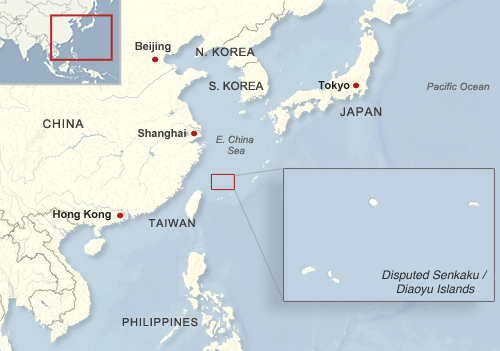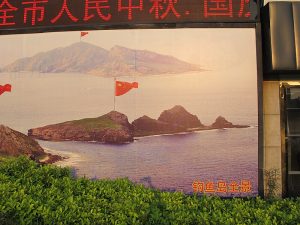The number of days Chinese government vessels were spotted in the contiguous zone of disputed islands in the East China Sea hit a record high in 2024 for the third consecutive year.
The China Coast Guard (CCG) also set a record for the number of vessels operating in the waters around the Japanese-controlled but Chinese-claimed islands, which are known as the Senkaku Islands in Japan and the Diaoyu Islands in China. It was the second year in a row the CCG had broken its own record.

A map showing the location of the Senkakuk/Diaoyu Islands. Map by Voice of America.
Data released by the Japan Coast Guard (JCG) shows that Chinese government vessels entered the contiguous zone, which is 12 to 24 nautical miles (22 to 44 kilometers) from the coast, on 355 out of 366 days during last year. That’s the highest figure since 2008, when official Chinese vessels were first confirmed navigating there, and an increase of three days compared with the previous record of 352 days set in 2023.
In 2024, a total of 1,351 Chinese government ships operated in the contiguous zone over 355 days, also setting a record for the number of vessels involved, according to the JCG data.
In addition, Chinese government vessels maintained an uninterrupted presence in the contiguous zone for 215 successive days between December 22, 2023 and July 23 last year, their longest ever continued presence in these waters.
The latest data suggests that Chinese government ships have been keeping up repeated incursions into waters around the contested, uninhabited islets, resulting in a presence that was maintained for almost the entire year.
In the past, CCG vessels were seen sailing almost every day, except during bad weather such as typhoons. But in recent years, their vessels have become larger and are able to sail regardless of the weather. It can be said that China, which is trying to take control of the islands, is moving to have its government vessels “permanently stationed” there.
More seriously, the data also shows that last year CCG ships intruded into Japanese territorial waters on 42 days, the same number of days as 2023 and the second highest number since 2013. Territorial waters refers to the area within 12 nautical miles (22 kilometers) of island coasts.
The latest statistics came out after Japan’s Kyodo news agency reported on December 30 that Chinese authorities had detained a Japanese woman in 2015 by charging her with espionage over her actions within Japan. The woman was arrested during a business trip in Shanghai in 2015 by China’s Ministry of State Security, which cracks down on espionage activities, after she had heard Chinese opinions on the Senkaku/Diaoyu Islands from Chinese officials at the Chinese Embassy in Tokyo from 2012 to 2013 and provided them to the Japanese government. This move came after the Japanese government nationalized the Senkaku Islands in Okinawa Prefecture in 2012 by purchasing three of those islands from their private owner.
The Senkaku Islands consist of five uninhabited islands and three rock reefs.
According to the Japanese news agency, the woman is now in her 60s and was previously an executive at a Japanese language school in Shinjuku, Tokyo. Originally from China, she had acquired Japanese nationality. She was released in August 2021 after completing her sentence. Then, after returning to Japan, she explained the details of the trial to the Japanese government, Kyodo reported.
The Japanese news agency reported that the information she provided to the Japanese government did not contain state secrets.
“This highlighted the Xi Jinping leadership’s hardline stance, which places great importance on national security,” Kyodo News said.
The territorial waters surrounding the Senkaku Islands span about 4,740 square kilometers, which is equivalent to six times the land area of New York City of the United States. To patrol this vast sea area, the JCG has stationed 10 1,000-ton patrol vessels on Ishigaki Island, which is located about 170 kilometers south of the Senkaku Islands. It also has two large 3,100-ton patrol vessels capable of carrying helicopters belonging to the Naha Coast Guard Office on Okinawa’s main island. About 600 members of the JCG are dedicated to duty around the clock to patrol the territorial waters around the Senkaku Islands.
Meanwhile, the CCG has been rapidly increasing its fleet size and capabilities, making its ships larger and more armed. According to the JCG’s annual report 2024, the CCG operated 159 vessels with full-load displacement of 1,000 tons or more as of the end of December 2023. That is more than twice the JCG’s 75 vessels in the same category.
Citing a Japanese government official, the Yomiuri Shimbun newspaper reported on January 1, 2025 that four CCG vessels equipped with 76 mm guns sailed through Japan’s contiguous zone around the Senkaku Islands on December 6 last year. The CCG vessels dispatched to the Senkaku Islands usually operate in a four-vessel convoy. This was the first time that all four CCG vessels were heavily armed with 76 mm guns, the paper said.
The 76 mm gun is used by navies around the world, and is also installed on the Japan Maritime Self-Defense Force’s destroyers such as the Asagiri class, the Murasame class, and the Abukuma class.
Contacted by The Diplomat on January 2, a spokesperson at the 11th Regional Coast Guard Headquarters in Naha declined to comment on the details of the December 6 case.
“We refrain from commenting on the size of the guns the Chinese government vessels are equipped with, as this would reveal our own capabilities,” the spokesperson said.































